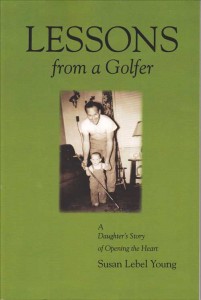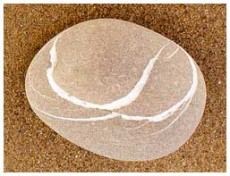
My father died five years ago today, the day I write this. A year and a week later, my daughter gave birth to twin boys, Walker and Taylor. He would have loved them, the sparkle in their now four-year-old eyes.
I feel Dad with me often, his words on calmness. “Like in golf,” he’d say. “You gotta stay steady. You can’t judge a rough shot as bad since it may be setting you up for a great approach.” He’d offer advice, “you gotta go inside for strength.” He cues me even now when I ask, “Dad, what would you say about this?”
My mother talks to him too, and I suspect my six siblings ask him questions. We get different answers, probably, but we all miss him. My mom speaks to his picture every day, her conversations ranging from, “How was I so lucky to have an amazing guy like you?” to “Ray, I’m so mad at you. How could you leave me like this?”
We laugh when she tells me about how she wags her forefinger at that photograph, the one with his own sparkly eyes and his easy grin. We reminisce. She tells me she did the same thing when her Dad died, “What would Daddy do?”
Today I am glad my Dad missed a lot of the mess in the world, fighting factions and all. He wouldn’t have liked that. Oh, he had ways to keep himself steady. He would have hobbled out of his den and the feuding reported on the nightly news. He would have retreated to his basement to practice his jazz horn or figure out Photoshop on his computer. But I am sorry he never knew my grand kids. He would smile at the social-emotional lessons they teach me today, the ones he taught me for sixty years, tried to anyway.
Here’s one: on a family ride one day, scrunched between Walker and Taylor’s car seats, I silently read a text copied to me from our 31-year-old son Zac who had written his 14-year-old recently-out gay friend, Sam. Sam wanted to quit school– the teasing, the not-so-secret notes passed about him, the slaps–the abuse was getting to him. Zac told Sam about his own life at fourteen: the bullying, harassment, name-calling, being thrown against lockers.
Zac wrote.”You’ll survive despite your childhood friends turning on you. You’ll even thrive if you use this middle school horror as a way to stay steady, to get stronger.” My Buddhist friends call this type of equanimity in facing trouble “using difficulties as opportunities for growth.” My Dad called it how to stay focused on your own game. Zac ended, “Sam, you’re the most mature and resilient fourteen year-old I know. You’re going to be fine. More than fine.” I started to cry and my grandsons saw me. Walker asked, “what’s wrong, Susu?”
I said, “I’m reading something and I feel sad about it.”
Taylor asked, “Why are you sad?”
I said, “Because I’m reading about how some people were not nice to other people.”
Walker asked, “Were they mean?”
I said, “Yes.”
Together they chorused, “Why would anyone be mean?”
I wish my Dad had heard their sweet innocence. He would have agreed. That toddler compassion and wisdom echoed his adult teachings on caring and kindness. Once I wanted to lash back at that popular girl who told me I was not good enough for her group. Dad said, “you gotta go to bed with yourself every night. You gotta sleep with what you did all day. Don’t be mean. ”
He meant something like the French proverb, “There is no pillow so soft as a clear conscience.” I am still learning these values. I am still mean sometimes when later I wished I’d smiled. I am still trying to be nice when it’s hard. I still miss my Dad lots because I think he would tell me, as Zac did Sam, to stay steady, to get up every day and do my best, to put my head on my pillow at night feeling ok about how I’d acted all day.
My heart/mind will pay attention always to my father’s responses to “Dad, what would you do here?” And now the gentle four-year-olds and wise fourteen-year-olds can teach me — can teach us—how to stay level-headed, how to be kind, how not to be mean. I hope, for all the fighting factions inside small me and outside in the big world, that we can listen.



Beautifully said, Sue! And what a dear story about your grandkids!